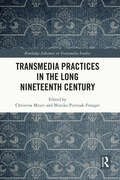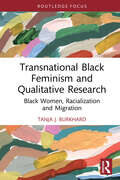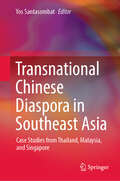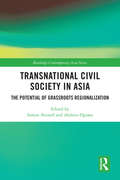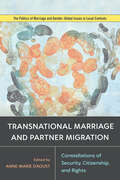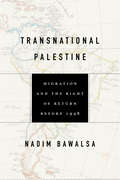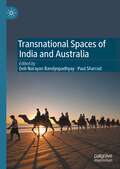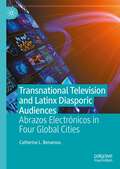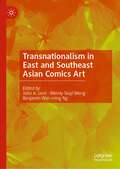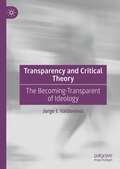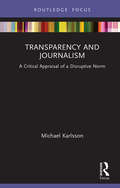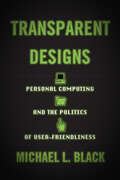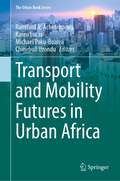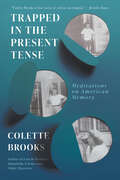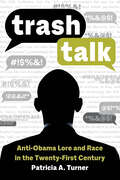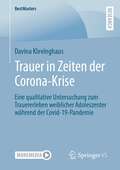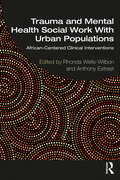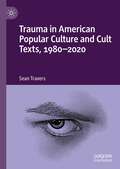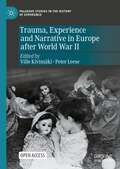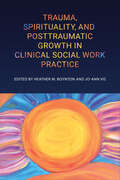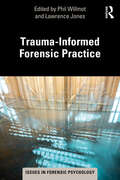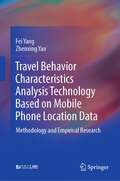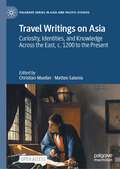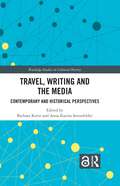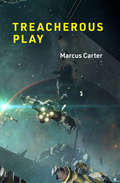- Table View
- List View
Transmedia Practices in the Long Nineteenth Century (Routledge Advances in Transmedia Studies)
by Monika Pietrzak-Franger Christina MeyerThis volume provides engaging accounts with transmedia practices in the long nineteenth century and offers model analyses of Victorian media (e.g., theater, advertising, books, games, newspapers) alongside the technological, economic, and cultural conditions under which they emerged in the Anglophone world. By exploring engagement tactics and forms of audience participation, the book affords insight into the role that social agents – e.g., individual authors, publishing houses, theatre show producers, lithograph companies, toy manufacturers, newspaper syndicates, or advertisers – played in the production, distribution, and consumption of Victorian media. It considers such examples as Sherlock Holmes, Kewpie Dolls, media forms and practices such as cut-outs, popular lectures, telephone conversations or early theater broadcasting, and such authors as Nellie Bly, Mark Twain, and Walter Besant, offering insight into the variety of transmedia practices present in the long nineteenth century. The book brings together methods and theories from comics studies, communication and media studies, English and American studies, narratology and more, and proposes fresh ways to think about transmediality. Though the target audiences are students, teachers, and scholars in the humanities, the book will also resonate with non-academic readers interested in how media contents are produced, disseminated, and consumed, and with what implications.
Transnational Black Feminism and Qualitative Research: Black Women, Racialization and Migration
by Tanja J. BurkhardTransnational Black Feminism and Qualitative Research invites readers to consider what it means to conduct research within their own communities by interrogating local and global contexts of colonialism, race, and migration. The qualitative data at the centre of this book stem from a yearlong qualitative study of the lived experiences of Black women, who migrated to or spent a significant amount of time in the United States, as well as from the author's experiences as a Black German woman and former international student. It proposes Transnational Black Feminism as a framework in qualitative inquiry. Methodological considerations emerging from and complementary to this framework critically explore qualitative concepts, such as reciprocity, care, and the ethics with which research is conducted, to account for shifts in power dynamics in the research process and to radically work against the dehumanization of participants, their communities, and researchers. This short and accessible book is ideal for qualitative researchers, graduate students, and feminist scholars interested in the various dimensions of racialization, coloniality, language, and migration.
Transnational Chinese Diaspora in Southeast Asia: Case Studies from Thailand, Malaysia, and Singapore
by Yos SantasombatThis book examines contemporary Chinese transnational mobile practices with special focuses on the ethnographic exploration of the lives, experiences, views, and narratives of the Chinese mobile subjects in three ASEAN countries: Malaysia, Singapore and Thailand, and their interactions with the ethnic Chinese communities in these countries. This book is based on recent and updated original ethnographic research carried out by leading scholars in China and Southeast Asia. The work addresses questions of integration and social embeddedness, interrogating the possibility of whether the transnational Chinese diaspora can be simultaneously embedded into two or more nation-states and geopolitical spheres. It contends that in moving in the transnational space, the Chinese diaspora may experience a strong yearning for a cultural home that may not be in one space for bicultural or multicultural diaspora. It also asks whether the transnational Chinese diaspora is motivated to negotiate cultural membership and social belonging in a new country. Shedding new light on the ways in which the transnational diaspora negotiates cultural membership to adapt to situational requirements, this volume is relevant to scholars researching in China studies, anthropology, international relations, and in Asian, Southeast and East Asian regional studies.
Transnational Civil Society in Asia: The Potential of Grassroots Regionalization (Routledge Contemporary Asia Series)
by Simon Avenell and Akihiro OgawaThis edited volume addresses how transnational interactions among civil society actors in Asia and its sub-regions are helping to strengthen common democratic values and transform dominant processes of policymaking and corporate capitalism in the region. The contributors conceive of transnational civil society networks as constructive vehicles for both informing and persuading governments and businesses to adopt, modify, or abandon certain policies or positions. This volume investigates the role of such networks through a range of interdisciplinary approaches, bringing together case studies on Asian transnationalism from South, Southeast, and Northeast Asia across four key themes: local transformations and connections, diaspora politics, cross-regional initiatives and networks, and global actors and influences. Chapters demonstrate how transnational civil society is connecting people in local communities across Asia, in parallel to ongoing tensions between nation-states and civil society. By highlighting the grassroots regionalization emerging from ever-intensifying information exchange between civil society actors across borders – as well as concrete transnational initiatives uniting actors across Asia – the volume advances the intellectual mandate of redefining ‘Asia’ as a dynamic and interconnected formation. Transnational Civil Society in Asia will appeal to students and scholars of international relations, politics and Asian studies more broadly.
Transnational Marriage and Partner Migration: Constellations of Security, Citizenship, and Rights (Politics of Marriage and Gender: Global Issues in Local Contexts)
by Pardis Mahdavi Eithne Luibhéid Rhacel Salazar Parrenas Ji-Yeon Yuh Laura Odasso Saskia Bonjour Audrey Macklin Helena Wray Massilia Ourabah Anne-Marie D'Aoust Betty De Hart Grace Tran Kerry Abrams Daniel Pham Manuela Salcedo Mieke VandenbrouckeThis multidisciplinary collection investigates the ways in which marriage and partner migration processes have become the object of state scrutiny, and the site of sustained political interventions in several states around the world. Covering cases as varied as the United States, Canada, Japan, Iran, France, Belgium or the Netherlands, among others, contributors reveal how marriage and partner migration have become battlegrounds for political participation, control, and exclusion. Which forms of attachments (towards the family, the nation, or specific individuals) have become framed as risks to be managed? How do such preoccupations translate into policies? With what consequences for those affected by them, in terms of rights and access to citizenship? The book answers these questions by analyzing the interplay between issues of security, citizenship and rights from the perspectives of migrants and policymakers, but also from actors who negotiate encounters with the state, such as lawyers, non-governmental organizations, and translators.
Transnational Palestine: Migration and the Right of Return before 1948 (Worlding the Middle East)
by Nadim BawalsaTens of thousands of Palestinians migrated to the Americas in the final decades of the nineteenth century and early decades of the twentieth. By 1936, an estimated 40,000 Palestinians lived outside geographic Palestine. Transnational Palestine is the first book to explore the history of Palestinian immigration to Latin America, the struggles Palestinian migrants faced to secure Palestinian citizenship in the interwar period, and the ways in which these challenges contributed to the formation of a Palestinian diaspora and to the emergence of Palestinian national consciousness. Nadim Bawalsa considers the migrants' strategies for economic success in the diaspora, for preserving their heritage, and for resisting British mandate legislation, including citizenship rejections meted out to thousands of Palestinian migrants. They did this in newspapers, social and cultural clubs and associations, political organizations and committees, and in hundreds of petitions and pleas delivered to local and international governing bodies demanding justice for Palestinian migrants barred from Palestinian citizenship. As this book shows, Palestinian political consciousness developed as a thoroughly transnational process in the first half of the twentieth century—and the first articulation of a Palestinian right of return emerged well before 1948.
Transnational Spaces of India and Australia
by Paul Sharrad Deb Narayan BandyopadhyayTransnational movements are more intricate than diasporic conflicts of ‘home and away’. They operate not only as international connections but also transect and disturb national formations. What are the spaces (both physical and temporal) in and around which transnational exchanges occur? Much discussion of the transnational focuses on international movements of law, politics and economics as they relate to Europe and the Americas. This book extends the focus to dynamics across the humanities and social sciences and concentrates on the historical and now growing interactions between India and Australia. Studies come from scholars in both countries, who combine academic depth for students and researchers and writing that is clear and engaging for the general reader.
Transnational Television and Latinx Diasporic Audiences: Abrazos Electrónicos in Four Global Cities
by Catherine L. BenamouThis book is based on a mixed-method, longitudinal study of the transmission, production, and reception of Spanish- and Portuguese-language television in four global cities with expanding Latinx diasporic populations. The author tracks and analyzes the production practices of Spanish-language broadcasters, the highlights of news and cultural affairs coverage, changes in the shooting locations and sociocultural discourses of telenovelas (both imported from Latin America and domestically produced), the presence of SLTV in the national political sphere, and the modes of media access and opinions of over 400 viewers in Detroit, Los Angeles, Miami, and Madrid. The possibilities created by SLTV and PLTV for achieving a sense of enfranchisement are explored. Intended for a general, as well as academic reading audience.
Transnationalism in East and Southeast Asian Comics Art
by John A. Lent Wendy Siuyi Wong Benjamin Wai–ming NgThis book explores various aspects of transnationalism and comics art in six East Asian and seven Southeast Asian countries/territories. The 14 richly illustrated chapters embrace comics, cartoons, and animation relative to offshore production, transnational ownership, multinational collaboration, border crossings of comics art creators and characters, expansion of overseas markets, cartoonists in political exile, colonial underpinnings, adaptation of foreign styles and formats, representation of other cultures, and more. Using case studies, historical accounts, descriptive overviews, individual artists’ profiles, and representational analyses, and fascinatingly told through techniques as document use, interviews, observation, and textual analyses, the end result is a thorough, interesting, and compact volume on transnationalism and comics art in East and Southeast Asia.
Transparency and Critical Theory: The Becoming-Transparent of Ideology
by Jorge I. ValdovinosThis book takes an interdisciplinary approach to the critique of contemporary ideology, offering an innovative genealogy of one of its most fundamental discursive manoeuvres: the ideological effacement of mediation. Providing a comprehensive historical revision of media (from the Greeks to the Internet), this book identifies several critical junctures at which the tension between visibility and invisibility has overlapped with conceptions of neutrality—a tension best incarnated in today's use of the word transparency. Then, it traces this term's evolving semantic constellation through a variety of intellectual discourses, exposing it as a key operator in the revaluation of ideals, sensibilities, and modalities of perception that lie at the core of our contemporary attention-based economy.
Transparency and Journalism: A Critical Appraisal of a Disruptive Norm (Disruptions)
by Michael KarlssonThis book offers a comprehensive, authoritative, and accessible introduction to journalistic transparency. Pulling from historical and theoretical perspectives, Transparency and Journalism explains the concept of transparency and its place in journalistic practice, offering a critical assessment of what transparency can and cannot offer to journalism. The author also reviews the key theoretical claims underlying transparency and how they have been researched in different parts of the world, ultimately proposing a communication model that can be used to study the concept of transparency across journalism research. Other topics discussed include the use of algorithmic forms of transparency, the limitations of the transparency myth, and suggestions for future avenues for research. Transparency and Journalism is an important resource for students and scholars in the field of journalism and media studies, as well as for journalists and researchers interested in delving into an ever-relevant topic for the field.
Transparent Designs: Personal Computing and the Politics of User-Friendliness (Studies in Computing and Culture)
by Michael L. BlackThis fascinating cultural history of the personal computer explains how user-friendly design allows tech companies to build systems that we cannot understand.Modern personal computers are easy to use, and their welcoming, user-friendly interfaces encourage us to see them as designed for our individual benefit. Rarely, however, do these interfaces invite us to consider how our individual uses support the broader political and economic strategies of their designers.In Transparent Designs, Michael L. Black revisits early debates from hobbyist newsletters, computing magazines, user manuals, and advertisements about how personal computers could be seen as usable and useful by the average person. Black examines how early personal computers from the Tandy TRS-80 and Commodore PET to the IBM PC and Apple Macintosh were marketed to an American public that was high on the bold promises of the computing revolution but also skeptical about their ability to participate in it. Through this careful archival study, he shows how many of the foundational principles of usability theory were shaped through disagreements over the languages and business strategies developed in response to this skepticism. In short, this book asks us to consider the consequences of a computational culture that is based on the assumption that the average person does not need to know anything about the internal operations of the computers we've come to depend on for everything.Expanding our definition of usability, Transparent Designs examines how popular and technical rhetoric shapes user expectations about what counts as usable and useful as much as or even more so than hardware and software interfaces. Offering a fresh look at the first decade of personal computing, Black highlights how the concept of usability has been leveraged historically to smooth over conflicts between the rhetoric of computing and its material experience. Readers interested in vintage computing, the history of technology, digital rhetoric, or American culture will be fascinated in this book.
Transport and Mobility Futures in Urban Africa (The Urban Book Series)
by Karen Lucas Ransford A. Acheampong Michael Poku-Boansi Chinebuli UzonduThis book provides a collection of insightful conceptual and empirical works that situate transport and mobility challenges in the unique context of individual countries and cities while highlighting commonalities across the African continent. Written from an interdisciplinary perspective, the book covers important themes in transport and mobility including the links between urbanization, urban structure, and accessibility; transport equity and poverty, non-motorized transport, public transport, and the challenges and opportunities of new and emerging transport technologies, and ICT-mediated mobility solutions. Each chapter engages with the normative imperatives that are critical to improving the transport and mobility situations of African urban areas now and in the future.
Trapped In the Present Tense: Meditations on American Memory
by Colette BrooksFor readers of Rebecca Solnit and Jenny Odell, this poetic and inventive blend of history, memoir, and visual essay reflects on how we can resist the erasure of our collective memory in this American century.Our sense of our history requires us to recall the details of time, of experiences that help us find our place in the world together and encourage us in the search for our individual identities. When we lose sight of the past, our ability to see ourselves and to understand one another is diminished. In this book, Colette Brooks explores how some of the more forgotten aspects of recent American experiences explain our challenging and often puzzling present. Through intimate and meticulously researched retellings of individual stories of violence, misfortune, chaos, and persistence—from the first mass shooting in America from the tower at the University of Texas, the televised assassinations of John F. Kennedy and Lee Harvey Oswald, life with nuclear bombs and the Doomsday Clock, obsessive diarists and round-the-clock surveillance, to pandemics and COVID-19—Brooks is able to reframe our country&’s narratives with new insight to create a prismatic account of how efforts to reclaim the past can be redemptive, freeing us from the tyranny of the present moment.
Trash Talk: Anti-Obama Lore and Race in the Twenty-First Century
by Patricia A. TurnerWhat racist rumors about Barack Obama tell us about the intractability of racism in American politics. Barack Obama and his family have been the objects of rumors, legends, and conspiracy theories unprecedented in US politics. Outbreaks of anti-Obama lore have occurred in every national election cycle since 2004 and continue to the present day—two elections after his presidency ended. In Trash Talk, folklorist Patricia A. Turner examines how these thought patterns have grown ever more vitriolic and persistent and what this means for American political culture. Through the lens of attacks on Obama, Trash Talk explores how racist tropes circulate and gain currency. As internet communications expand in reach, rumors and conspiracy theories have become powerful political tools, and new types of lore like the hoax and fake news have taken root. The mainstream press and political establishment dismissed anti-Obama mythology for years, registering concern only when it became difficult to deny how much power those who circulated it could command. Trash Talk demonstrates that the ascendancy of Barack Obama was never a signal of a postracial America.
Trauer in Zeiten der Corona-Krise: Eine qualitative Untersuchung zum Trauererleben weiblicher Adoleszenter während der Covid-19-Pandemie (BestMasters)
by Davina KlevinghausDie Covid-19-Pandemie tangiert das Alltagserleben zahlreicher junger Menschen in Deutschland mitunter gravierend. Wie kann es unter diesen Umständen gelingen, die Trauer nach dem Verlust einer nahestehenden Person in ein von Unabwägbarkeiten und radikalen Veränderungen geprägtes Leben zu integrieren? Welche Belastungen und Ressourcen rücken in Anbetracht der ubiquitären Bedrohung durch das Coronavirus besonders in den Fokus? Auf diese Fragen sowie auf weitere Spezifika des Trauererlebens weiblicher Adoleszenter im Zuge der Pandemie wird - rekurrierend auf Bezugstheorien der Trauer- und Stressforschung - der Schwerpunkt der vorliegenden Arbeit gerichtet. Die geführten Interviews deuten auf erhebliche interindividuelle Unterschiede im Pandemie- und Verlusterleben sowie in den Verarbeitungsformen der eigenen Trauer hin. Zugleich lassen sich zahlreiche geteilte Erfahrungen rekonstruieren. Insofern bieten die Analysen einen grundlegenden Reflexionsanlass im Hinblick auf die Partizipationsmöglichkeiten junger Menschen, den Zugang zu trauerbezogenen Unterstützungsangeboten sowie auf den gesamtgesellschaftlichen Umgang mit Sterben, Tod und Trauer.
Trauma and Mental Health Social Work With Urban Populations: African-Centered Clinical Interventions
by Rhonda Wells-Wilbon Anthony EstreetAddressing the social problems associated with trauma and mental health amongst African Americans in urban environments, this book uses an African-centered lens to critique the most common practice models and interventions currently employed by social workers in the field. Divided into four parts and grounded in traditional African cultural values, it argues that basic key values in a new clinical model for mental health diagnosis are: A spiritual component Collective/group approach Focus on wholeness Oneness with Nature Emphasis on truth, justice, balance, harmony, reciprocity, righteousness, and order Being free from racism, sexism, classism, and other forms of oppression, this African-centered approach is crucial for working with people of African origin who experience daily "trauma" through adverse living conditions. This book will be key reading on any practice and direct service course at both BSW and MSW level and will be a useful supplement on clinical courses as well as those aimed at working with diverse populations and those living in urban environments.
Trauma in American Popular Culture and Cult Texts, 1980-2020
by Sean TraversThis book examines trauma in late twentieth- and twenty-first century American popular culture. Trauma has become a central paradigm for reading contemporary American culture. Since the early 1980s, an extensive range of genres increasingly feature traumatised protagonists and traumatic events. From traumatised superheroes in Hollywood blockbusters to apocalyptic-themed television series, trauma narratives abound. Although trauma is predominantly associated with high culture, this project shows how popular culture has become the most productive and innovative area of trauma representation in America. Examining film, television, animation, video games and cult texts, this book develops a series of original paradigms through which to understand trauma in popular culture. These include: popular trauma texts’ engagement with postmodern perspectives, formal techniques termed ‘competitive narration’, ‘polynarration’ and ‘sceptical scriptotherapy’, and perpetrator trauma in metafictional games.
Trauma, Experience and Narrative in Europe after World War II (Palgrave Studies in the History of Experience)
by Peter Leese Ville KivimäkiThis book promotes a historically and culturally sensitive understanding of trauma during and after World War II. Focusing especially on Eastern and Central Europe, its contributors take a fresh look at the experiences of violence and loss in 1939–45 and their long-term effects in different cultures and societies. The chapters analyze traumatic experiences among soldiers and civilians alike and expand the study of traumatic violence beyond psychiatric discourses and treatments. While acknowledging the problems of applying a present-day medical concept to the past, this book makes a case for a cultural, social and historical study of trauma. Moving the focus of historical trauma studies from World War I to World War II and from Western Europe to the east, it breaks new ground and helps to explain the troublesome politics of memory and trauma in post-1945 Europe all the way to the present day. This book is an outcome of a workshop project ‘Historical Trauma Studies,’ funded by the Joint Committee for the Nordic Research Councils in the Humanities and Social Sciences (NOS-HS) in 2018–20.Chapters 4, 5 and 6 are available open access under a Creative Commons Attribution 4.0 International License via link.springer.com.
Trauma, Spirituality, and Posttraumatic Growth in Clinical Social Work Practice
by Heather M. Boynton Jo-Ann VisTrauma and the exposure to traumatic events is part of life, making the need for current and informed social work research and training in this area essential. Trauma, Spirituality, and Posttraumatic Growth in Clinical Social Work Practice highlights unique and diverse circumstances throughout a client’s lifecycle where trauma is experienced, how one’s spirituality is awakened or activated, and how this experience can intersect with interventions toward posttraumatic growth (PTG). More than just a primer on trauma effects, the book offers social workers insights into how to properly assess current resources and individual levels of distress. It also provides practical strategies on how spirituality and spiritual practices can be integrated into psychotherapeutic interventions at various levels of social work practice. Addressing the impact of trauma-related events and emphasizing the importance of spirituality, the book will inspire and provide transferable knowledge that social workers can use to meet the unique needs of the clients, families, and communities they serve.
Trauma-Informed Forensic Practice
by Phil WillmotTrauma-Informed Forensic Practice argues for placing trauma-informed practice and thinking at the heart of forensic services. It is written by forensic practitioners and service users from prison and forensic mental health, youth justice, and social care settings. It provides a compassionate theoretical framework for understanding the links between trauma and offending. It also gives practical guidance on working with issues that are particularly associated with a history of trauma in forensic settings, such as self-harm and substance use, as well as on working with groups who are particularly vulnerable to trauma, such as those with intellectual disabilities and military veterans. Finally, it considers organisational aspects of delivering trauma-informed care, not just for service users but for the staff who work in challenging and dangerous forensic environments. The book is the first of its kind to address such a broad range of issues and settings. It is aimed at forensic practitioners who wish to develop their own trauma-informed practice or trauma-responsive services. It also provides an accessible introduction to trauma-informed forensic practice for undergraduate and postgraduate students.
Travel Behavior Characteristics Analysis Technology Based on Mobile Phone Location Data: Methodology and Empirical Research
by Fei Yang Zhenxing YaoThis book is devoted to the technology and methodology of individual travel behavior analysis and refined travel information extraction. Traditional resident trip surveys are characterized by many shortcomings, such as subjective memory errors, difficulty in organization and high cost. Therefore, in this book, a set of refined extraction and analysis techniques for individual travel activities is proposed. It provides a solid foundation for the optimization and reconstruction of traffic theoretical models, urban traffic planning, management and decision-making. This book helps traffic engineering researchers, traffic engineering technicians and traffic industry managers understand the difficulties and challenges faced by transportation big data. Additionally, it helps them adapt to changes in traffic demand and the technological environment to achieve theoretical innovation and technological reform.
Travel Writings on Asia: Curiosity, Identities, and Knowledge Across the East, c. 1200 to the Present (Palgrave Series in Asia and Pacific Studies)
by Christian Mueller Matteo SaloniaThis open access book provides an analysis of human actors and their capacity to explore and conceptualise their own agency by being curious, gathering knowledge, and shaping identities in their travel reflections on Asia. Thus, the actors open windows across time to present a profound overview of diverse descriptions and constructions of Asia. It is demonstrated that international and transnational history contributes to and benefits from analyses of national and local contexts that in turn enrich our understanding of transcultural encounters and experiences across time. The book proposes an actor-centred contextual approach to travel writing to recount meaningful constructions of Asia’s physical, political and spiritual landscapes. It offers comparative reflections on the patterns of encounter across Eurasia, where from the late medieval period an idea of civilisation was transculturally shared yet also constantly questioned and reframed. Tailored for academic and public discussions alike, this volume will be invaluable for both scholars of Global History and interested audiences to stimulate further discussions on the nature of global encounters in Asia.
Travel, Writing and the Media: Contemporary and Historical Perspectives (Routledge Studies in Cultural History #116)
by Barbara KorteThe nexus between travel, writing and media in the contemporary world is dense: travel practice is increasingly interwoven with media; representations in old and new media are co-present and converge. Digitization has had profound impact on the practice and mediation of travel, but this volume aims to show that travel and its representation have always been enlaced with media. With contributions by experts in literary and cultural studies, journalism studies and informatics, the book takes a multi- and interdisciplinary approach and covers a wide range of media, from the hand-crafted album to social media. It illustrates how current transformations invite us to revisit earlier periods of travel writing and their media environments, and to explore the ways in which contemporary forms of mediation are prefigured by earlier practices and forms. The book addresses readers interested in travel writing, travel studies and cultural studies.
Treacherous Play (Playful Thinking)
by Marcus CarterThe ethics and experience of &“treacherous play&”: an exploration of three games that allow deception and betrayal—EVE Online, DayZ, and Survivor.Deception and betrayal in gameplay are generally considered off-limits, designed out of most multiplayer games. There are a few games, however, in which deception and betrayal are allowed, and even encouraged. In Treacherous Play, Marcus Carter explores the ethics and experience of playing such games, offering detailed explorations of three games in which this kind of &“dark play&” is both lawful and advantageous: EVE Online, DayZ, and the television series Survivor. Examining aspects of games that are often hidden, ignored, or designed away, Carter shows the appeal of playing treacherously. Carter looks at EVE Online&’s notorious scammers and spies, drawing on his own extensive studies of them, and describes how treacherous play makes EVE successful. Making a distinction between treacherous play and griefing or trolling, he examines the experiences of DayZ players to show how negative experiences can be positive in games, and a core part of their appeal. And he explains how in Survivor&’s tribal council votes, a player&’s acts of betrayal can exact a cost. Then, considering these games in terms of their design, he discusses how to design for treacherous play. Carter&’s account challenges the common assumptions that treacherous play is unethical, antisocial, and engaged in by bad people. He doesn&’t claim that more games should feature treachery, but that examining this kind of play sheds new light on what play can be.
